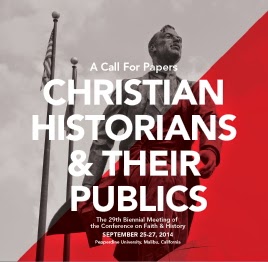 I just returned from the Conference on Faith and History which was held at Pepperdine University from September 24-28. On Saturday, I presented a paper as part of a panel titled, Professors, Prisoners, and the Polls: Engaging the Past in the Public Square. The session was chaired by Dwight Brautigam, Huntington University. Other papers given were: “In God We Trust”: Teaching Faith In and Through the U.S. Capitol, by Fred Beuttler, Carroll University and former Deputy Historian for the U.S. House of Representatives, and Teaching History Behind Bars: The Public Platform of a Texas Maximum Security Prison, presented by John Wilsey, professor at Southwestern Baptist Theological Seminary. The featured commenter was Jonathan Boyd, InterVarsity Press.
I just returned from the Conference on Faith and History which was held at Pepperdine University from September 24-28. On Saturday, I presented a paper as part of a panel titled, Professors, Prisoners, and the Polls: Engaging the Past in the Public Square. The session was chaired by Dwight Brautigam, Huntington University. Other papers given were: “In God We Trust”: Teaching Faith In and Through the U.S. Capitol, by Fred Beuttler, Carroll University and former Deputy Historian for the U.S. House of Representatives, and Teaching History Behind Bars: The Public Platform of a Texas Maximum Security Prison, presented by John Wilsey, professor at Southwestern Baptist Theological Seminary. The featured commenter was Jonathan Boyd, InterVarsity Press.
The abstract is below, the full paper is at the link.
Abstract
David Barton is a popular Christian writer who specializes in making a public case that America is a Christian nation. Immensely popular with conservative Christians, Barton distorts historical events to support conservative political positions in the present day. Up until recently, left-leaning and progressive critics have led the way in calling out Barton’s historical errors in the public square.
However, in 2012, David Barton published a book on Thomas Jefferson that generated much public reaction, most of it critical, from Christian scholars. Along with co-author Michael Coulter, I published a book length critique of Barton’s work on Jefferson. Eventually, publisher Thomas Nelson listened to the critics and pulled Barton’s book from publication.
This episode was unprecedented in that a Christian publisher pulled a New York Times bestselling book due to vocal public complaints from Christian scholars. What can be learned from this situation?
I take the position that Christian historians and other scholars should engage their brethren in critical scholarship when other avenues have not brought resolution. Myth-busting in this situation can serve the Kingdom and our vocation by placing a quest for truth above narrow in group interests. In-group pressures are often so strong that no real change will occur if those within the Christian community do not raise issues publicly.
Read the entire paper.
Read all posts on the Conference on Faith and History.